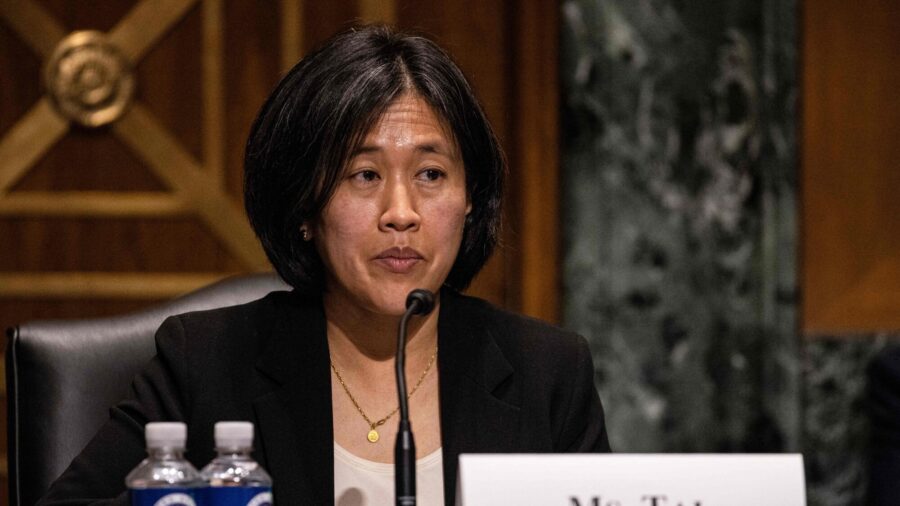WASHINGTON—The Biden administration will announce on Monday its “new strategy” on trade relations with China, which will include extending tariff exclusion on certain Chinese goods, according to senior administration officials.
U.S. Trade Representative Katherine Tai, in a speech at a Washington think tank on Monday, is planning to reveal the China trade policy of the Biden administration. Her announcement will focus on the bilateral trade agreement and the tariffs on hundreds of billions of dollars of Chinese imports imposed by the previous administration.
“First, our objective is not to escalate trade tensions with China or double down on the previous administration’s flawed strategy,” a senior administration official told reporters on Sunday during a conference call ahead of the announcement.
As part of the new trade strategy, the office of the U.S. Trade Representative (USTR) will revisit the phase one trade agreement signed between the United States and China in January last year and ask Beijing to follow through on the commitments it has made.
The phase one trade deal signed during the Trump administration requires China to buy $200 billion worth of additional U.S. goods and services during the two-year period of 2020 and 2021. Analysis of Chinese trade data by the Peterson Institute for International Economics showed that China has met about 58 percent of its purchase commitments in 2020 and 69 percent through Aug. 2021.
According to the Biden administration, results from the agreement are mixed, with the agriculture sector benefiting the most from the agreement. Beijing has met about 92 percent of its import target in agriculture but has fallen short in meeting its commitments in manufactured goods and energy.
After a comprehensive review, the administration plans to use the enforcement mechanism under the agreement to ensure that China meets those commitments.
“Second, we will start a targeted tariff exclusion process. We will also keep open the potential for additional exclusion processes in the future,” the official said.
President Joe Biden has maintained the tariffs on nearly $360 billion worth of Chinese goods enacted by the previous administration.
But Biden officials believe that the previous administration’s tariff campaign didn’t address China’s unfair trade practices and instead, hurt select sectors of the economy.
While it’s unclear which goods or sectors will benefit from the tariff exclusion process, the administration says it will “align existing tariffs” with its priorities, which is to protect American workers and producers.
“We will see how China responds to what Ambassador Tai will detail tomorrow, and we will adjust accordingly,” the official said. “But we do not want to take any options off the table or preemptively box ourselves into a set course of action.”
The administration also said it recognized the fact that “China simply may not change” and that “we have to have a strategy that deals with China as it is, rather than as we might wish it to be.”
The Trump administration previously indicated that tariffs on Chinese goods were justified to address Beijing’s unfair trade policies, including intellectual property theft, forced technology transfers, and massive government subsidies for its companies.
During the signing of the phase one agreement, then-President Donald Trump said he would retain tariffs on Chinese goods as leverage for the next round of talks.
The Biden administration says it doesn’t plan to pursue a second phase agreement with Beijing.
“We’ll focus on phase one engagement,” the senior administration official said. “We will raise concerns on industrial policies, but we are not seeking a phase two negotiation.”
Biden has repeatedly indicated that his strategy will be tackling China “from a position of strength” by investing domestically and building close ties with allies as a way to address China’s unfair practices.
Ambassador Tai is expected to engage with her Chinese counterparts “soon” to discuss progress made in the trade deal and China’s industrial policies.
Companies and trade associations have been pushing hard against tariffs imposed on Chinese goods. More than 6,000 U.S firms—including Ford, Tesla, and Home Depot—filed lawsuits in the U.S. Court of International Trade seeking to upend these tariffs.
Companies have also sent a letter to Biden asking him to settle the litigation. They stated that the levies “are not tough on China” but “are tough on U.S. companies, U.S. workers, and consumers who have paid these tariffs as a tax out of their own pockets.”
From The Epoch Times


